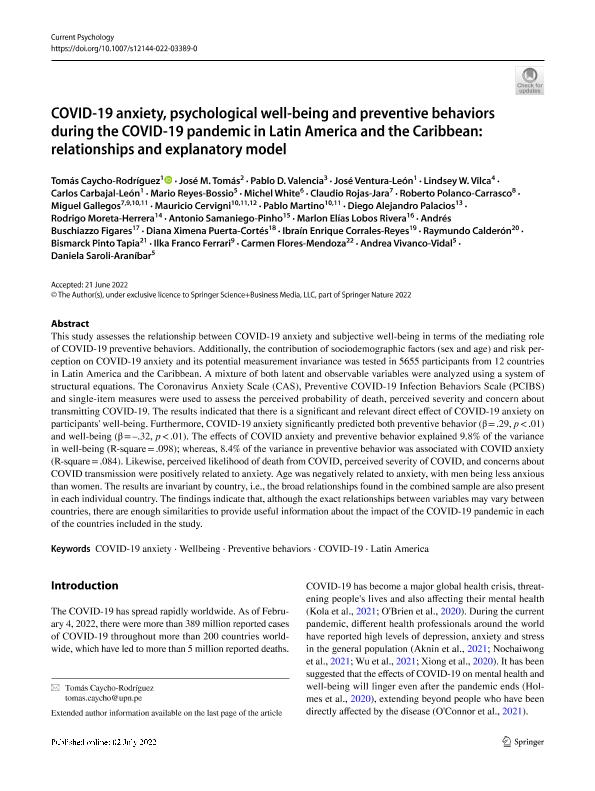Artículo
COVID-19 anxiety, psychological well-being and preventive behaviors during the COVID-19 pandemic in Latin America and the Caribbean: relationships and explanatory model
Caycho Rodríguez, Tomás; Tomás, José M.; Valencia, Pablo D.; Ventura León, José; Vilca, Lindsey W.; Carabajal León, Carlos; Reyes Bossio, Mario; White, Michel; Rojas Jara, Claudio; Polanco Carrasco, Roberto; Gallegos, Miguel; Cervigni, Mauricio; Martino, Pablo Luis ; Palacios, Diego Alejandro; Moreta Herrera, Rodrigo; Samaniego Pinho, Antonio; Lobos Rivera, Marlon Elías; Buschiazzo Figares, Andrés; Puerta Cortés, Diana Ximena; Corrales Reyes, Ibraín Enrique; Calderón, Raymundo; Tapia, Bismarck Pinto; Ferrari, Ilka Franco; Flores Mendoza, Cármen; Vivanco Vidal, Andrea; Saroli Araníbar, Daniela
; Palacios, Diego Alejandro; Moreta Herrera, Rodrigo; Samaniego Pinho, Antonio; Lobos Rivera, Marlon Elías; Buschiazzo Figares, Andrés; Puerta Cortés, Diana Ximena; Corrales Reyes, Ibraín Enrique; Calderón, Raymundo; Tapia, Bismarck Pinto; Ferrari, Ilka Franco; Flores Mendoza, Cármen; Vivanco Vidal, Andrea; Saroli Araníbar, Daniela
 ; Palacios, Diego Alejandro; Moreta Herrera, Rodrigo; Samaniego Pinho, Antonio; Lobos Rivera, Marlon Elías; Buschiazzo Figares, Andrés; Puerta Cortés, Diana Ximena; Corrales Reyes, Ibraín Enrique; Calderón, Raymundo; Tapia, Bismarck Pinto; Ferrari, Ilka Franco; Flores Mendoza, Cármen; Vivanco Vidal, Andrea; Saroli Araníbar, Daniela
; Palacios, Diego Alejandro; Moreta Herrera, Rodrigo; Samaniego Pinho, Antonio; Lobos Rivera, Marlon Elías; Buschiazzo Figares, Andrés; Puerta Cortés, Diana Ximena; Corrales Reyes, Ibraín Enrique; Calderón, Raymundo; Tapia, Bismarck Pinto; Ferrari, Ilka Franco; Flores Mendoza, Cármen; Vivanco Vidal, Andrea; Saroli Araníbar, Daniela
Fecha de publicación:
07/2022
Editorial:
Springer
Revista:
Current Psychology
ISSN:
1046-1310
e-ISSN:
1936-4733
Idioma:
Inglés
Tipo de recurso:
Artículo publicado
Clasificación temática:
Resumen
This study assesses the relationship between COVID-19 anxiety and subjective well-being in terms of the mediating role of COVID-19 preventive behaviors. Additionally, the contribution of sociodemographic factors (sex and age) and risk perception on COVID-19 anxiety and its potential measurement invariance was tested in 5655 participants from 12 countries in Latin America and the Caribbean. A mixture of both latent and observable variables were analyzed using a system of structural equations. The Coronavirus Anxiety Scale (CAS), Preventive COVID-19 Infection Behaviors Scale (PCIBS) and single-item measures were used to assess the perceived probability of death, perceived severity and concern about transmitting COVID-19. The results indicated that there is a significant and relevant direct effect of COVID-19 anxiety on participants' well-being. Furthermore, COVID-19 anxiety significantly predicted both preventive behavior (β =.29, p <.01) and well-being (β = –.32, p <.01). The effects of COVID anxiety and preventive behavior explained 9.8% of the variance in well-being (R-square =.098); whereas, 8.4% of the variance in preventive behavior was associated with COVID anxiety (R-square =.084). Likewise, perceived likelihood of death from COVID, perceived severity of COVID, and concerns about COVID transmission were positively related to anxiety. Age was negatively related to anxiety, with men being less anxious than women. The results are invariant by country, i.e., the broad relationships found in the combined sample are also present in each individual country. The findings indicate that, although the exact relationships between variables may vary between countries, there are enough similarities to provide useful information about the impact of the COVID-19 pandemic in each of the countries included in the study.
Palabras clave:
COVID-19
,
COVID-19 ANXIETY
,
LATIN AMERICA
,
PREVENTIVE BEHAVIORS
,
WELLBEING
Archivos asociados
Licencia
Identificadores
Colecciones
Articulos(CCT - ROSARIO)
Articulos de CTRO.CIENTIFICO TECNOL.CONICET - ROSARIO
Articulos de CTRO.CIENTIFICO TECNOL.CONICET - ROSARIO
Articulos(CCT - SANTA FE)
Articulos de CTRO.CIENTIFICO TECNOL.CONICET - SANTA FE
Articulos de CTRO.CIENTIFICO TECNOL.CONICET - SANTA FE
Citación
Caycho Rodríguez, Tomás; Tomás, José M.; Valencia, Pablo D.; Ventura León, José; Vilca, Lindsey W.; et al.; COVID-19 anxiety, psychological well-being and preventive behaviors during the COVID-19 pandemic in Latin America and the Caribbean: relationships and explanatory model; Springer; Current Psychology; 2022; 7-2022; 1-15
Compartir
Altmétricas



